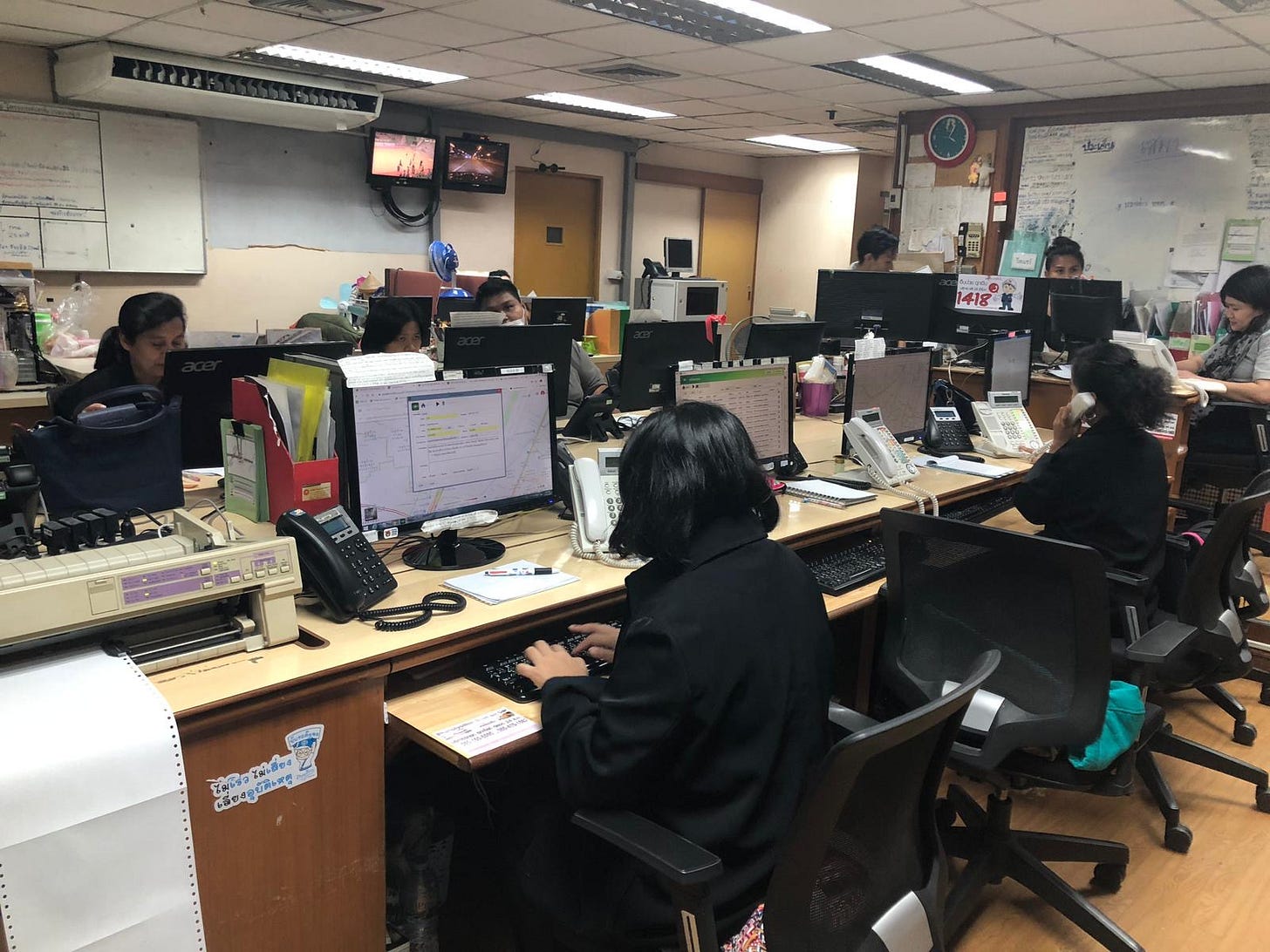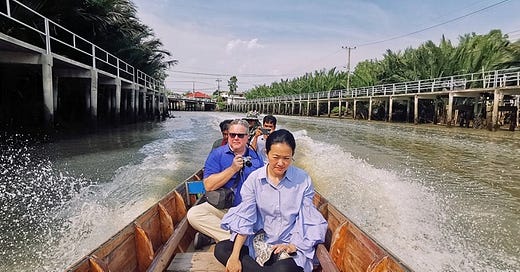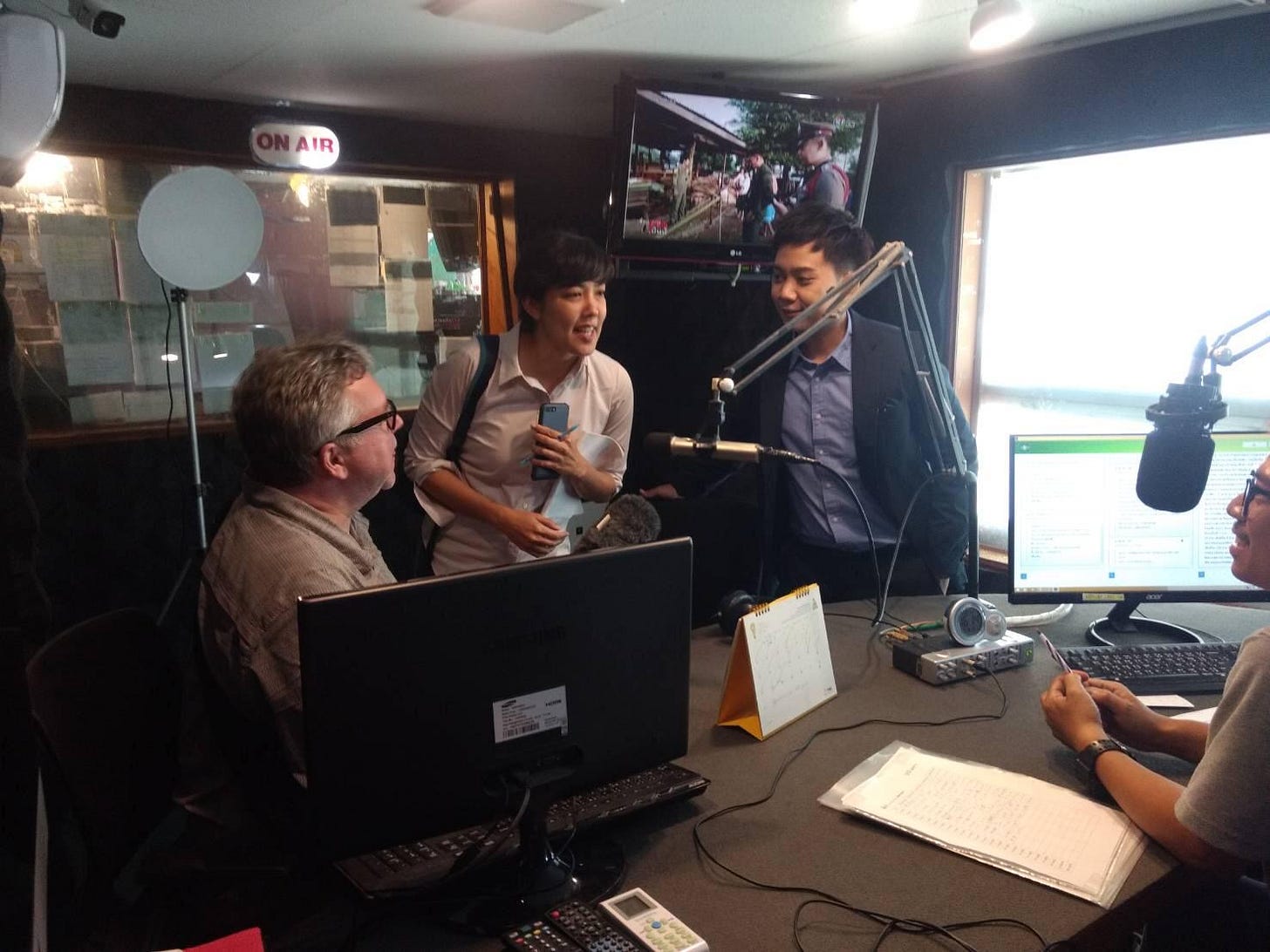WWJS100D? aka The Power of Nothing
Or “What I learned from a radio station in Thailand that forever changed how I think about audio.”
Welcome to Issue #5 of The Audio Insurgent.
So today I have one big thing: Following up on my last post about solving problems...the power of having nothing except passion for an idea. Also, one operational thing: Part 3 in my look at creating production budgets.
PODCASTERS AND STREAMERS: This may initially seem like it is a very radio-centric post, but it really isn’t--it has a ton of application for you too. Stick with me.
Instead of WWJD, this post is about WWJS100D...
[BIG STRATEGIC THING: THE POWER OF NOTHING] A lot of people wrote to tell me how much they liked my last newsletter, focused around the importance of solving problems with your audio projects. This post builds off that. It’s the story of an insane radio station I encountered in Thailand called JS100 and what it teaches up about innovation and not seeing limitations as, well, limitations.
I had a profound and deeply moving experience about 17 months ago that I wasn’t expecting or even looking for. This is a picture of me in Bangkok, Thailand, in September of 2019, doing some reporting and recording for what would become the pilot episode for the TED podcast Far Flung with Saleem Reshamwala. (If you want to see the dramatic effects of coastal erosion and climate change on Bangkok, the waterway we are jetting down was a road ten years ago).
We were there for a few days, and I kept hearing about this radio station: JS 100 (hearing it said in Thai sounds like “J-S-Ma”). Often I was hearing it everywhere I went (in almost every taxi and playing in many shops)--other times people talked about it with...reverence. I asked Palin Wedel, the Thai journalist I was working with, about this station and I became so taken by the story of this station that Palin and I talked our way into a tour and visit with the staff.
If you had to describe JS100 in terms we’d understand, it is a news and traffic radio station. In fact, that is what the station set out to be 30 years ago. Traffic in Bangkok is ridiculous (on a good day) and the station owners wanted to create a station that could provide news, weather, and traffic information to listeners stuck in their cars.
The problem was that there is no centralized traffic reporting or information system in Bangkok. There was no GPS or traffic data. There wasn’t even a coordinated police or government system to deal with traffic. So JS100 kinda made all that up.
They asked the station’s listeners to provide the information they would report. See a traffic jam? Call the station. Flooding in a neighborhood? Fire trucks blocking the street? Ambulance stuck in traffic? Call the station.
JS100 basically implemented crowdsourcing 15 years before crowdsourcing was even a word.
As impressive as their bootstrapping was--it isn’t the best part of the story. The best part was how that crowdsourced system evolved.
The station was an immediate hit--everyone in Bangkok either listens to JS100 or will tell you, at length, exactly why they don’t listen. Once the station became the preeminent radio station in Bangkok, something happened: Listeners started to call into the station with other reports and requests for help.
One caller says her elderly mother with dementia has wandered off--could listeners keep an eye out for her? A caller left her purse on a city bus and wants listeners to help find the bus in traffic. A caller is from a rural town and is overwhelmed and lost driving in the city. A caller came home to find a snake in her kitchen and needed to know how to get rid of it.

The weird thing: this totally works. The audience responds. They give advice. They connect people. They physically go to where someone needs help and help them. As a listener, you follow along with the story of getting the cat out of the tree, the elderly relative returned home, the student in the park sent home because he is late. These are great stories to hear.
But it goes even deeper. JS100 has become the de facto emergency response system for the city of Bangkok, a city of 8.5 million. JS100 dispatches fire trucks and ambulances. It mobilizes its audience to find people with expertise or answers. It has producers who liaison with the police and government to help solve problems. All in real time and all live on the radio.
While I was visiting JS100, someone called in saying that an ambulance transporting a severely ill man was stuck in traffic. JS100’s producers called the person who controls all the traffic lights in Bangkok and had them turn all the lights green between the ambulance’s location and the hospital.
During the 2011 floods in Bangkok, when half the city was underwater for four months, JS100 was the only place that not only provided news and updates on which areas were flooded, but also broadcast the location of relief supplies as well as provided health and safety information.
The week before I was there, a man left $16,000 in cash in the back of a cab (it’s a whole other story why he had $16,000 in cash in a plastic bag in a cab). Once he realized what had happened, he called JS100 and described the cab. JS100 tapped into the CCTV system, found a picture of the cab, got its license number, and asked listeners to find the cab. Believe it or not, every dollar was returned to the guy.
I could go on and on with stories, but I think you get the point.
I found all of this incredibly humbling. Throughout my earlier 20+ years working in public radio I described my work as a public service. Yet, these folks at JS100 literally saved lives, every day. They made tangible change in their community, every day. They had arguably done more public service that week than I had done in my entire career.
When I was interviewing the station’s CEO about their work and why they did it, tears came down her cheeks.
So why am I telling you about this amazing group of people running this unusually awesome station? Because they have a lot to teach us about the power of audio as well as the importance of focus and perseverance.
When JS100 started, they had nothing besides an idea to address a problem. They had their knowledge, their skills, and their tenacity. They had no resources, they had no infrastructure, and they had no clear way of doing the thing they felt HAD to be done. All they had was a problem they wanted to solve and a big pile of excuses not to do it.
Seriously, that was the one thing they had in abundance: reasons to drop it. It would be hard.
When I talk to a lot of radio people today, I hear those kind of excuses a lot: I want to do X. The resources and support I would need aren’t there. This will be hard.
I hear similar things from podcasters too: I want to do Project X. No one is giving me the money or support to create Project X. This will be hard.
I challenge that. I think they are thinking backwards. They are focused on what they lack instead of concentrating on the problem they want to solve.
Think about your community. What is a problem you can solve? Given your talent, your skill, your network, and your values--pick a problem you can solve.
Many people assume that their biggest challenge is a lack of money, resources, or time. That’s rarely true. There have been a few situations in the past where I was told “money is no problem” in solving a situation--and almost every time I rushed too quickly to the wrong solution. Sometimes having nothing is a blessing. It forces you to think differently. Like our audio colleagues at JS100, they were driven and passionate about making a difference, and they figured out a way to make it work with what they had--including resources they didn’t even recognize as resources when they started.
It’s all mindset.
Further, and unlike radio in the U.S., as other potentially competitive or disruptive technologies and tools emerged, like the Internet, smart phones, social media, and streaming technologies--JS100 didn’t view them as a threat. They asked: “How can I use this to improve what I’m doing?” As a result, they are incredibly crafty about how they use Twitter, Facebook, and their own app, which allows people to submit help requests or provide reports directly through the app--and you can listen there too (Google / Apple).
Often, when a problem or obstacle presents itself, it is quite revealing about those who have to deal with it. Some people show they just want everything to remain the same. Others embrace the notion that nothing ever stays the same.
If the focus is on mission, excuses and obstacles tend to become more manageable and threats start to look more like opportunities.
Also worth noting, JS100 is a commercial station. They are a business--and a good, thriving, and very profitable business. But they are that way because they lead with mission and passion, and the money follows. That’s a lesson that all radio in the US should heed (even public radio).
So the next time you are confronted with problems and obstacles, think WWJS100D--what would JS100 do?
One last picture:
While we were touring the station, they asked me to sit in a chair in the air studio for a moment, and boom--we were live on air, with them asking me questions about why I was so impressed with what they do. Here you see all of us listening as Palin translates my rambling.
[BIG OPERATIONAL THING: HOW TO CREATE A PRODUCTION BUDGET, PART 3]
If you didn’t read the previous installments about budgets, you should go do so now. The first part, about staff costs, it is at the bottom of Issue #3. The second part, on the nine other questions you should ask before writing down any numbers, is at the bottom of Issue #4.
After those two parts, there really isn’t a lot to do except share the spreadsheet.
But here are a few thoughts:
I often tell creators who are budget-phobic that budgets tell stories. Stories in a different language than they normally use, but stories nonetheless. They offer specific answers to questions about how you will approach a project or opportunity.
That’s also what makes budgets hard: they are specific.
I always say as a manager and leader that my primary job is to create an environment where greatness happens. Not “good” happens. Not where “adequate” happens. And even not where “expected” happens. Create an environment where greatness happens. That’s what budgets can do too.
You’ve just learned the rationale I told myself in order to get over my own budget-phobia years ago. Plus, once you get to know them, spreadsheets are pretty rad.
And with that...you can find a sample budget spreadsheet here based on what we use at Magnificent Noise to create audio project budgets--which you are welcome to copy, use, alter, whatever works for you. It includes all the comments made here in the last three newsletters in the appropriate cells.
Just play with it. Put together a budget for a project you’ve always wanted to make. What would it really cost?
That’s it for now. Again, if you enjoy this, please let me know. If you are getting this via email, you can simply reply to the newsletter and it goes straight to me (and doesn’t post your response anywhere, either, fyi).
If you read this somewhere other than your inbox, could you consider subscribing? It’s free.
Make great things and remember, WWJS100D.
I’ll be listening.
--Eric








